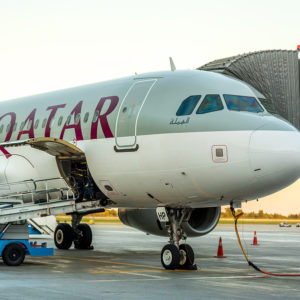One of the key reasons many workers across the country supported Donald Trump in the 2016 election was his willingness to call out countries that violate U.S. trade agreements. For far too long, the United States has been unwilling to enforce its trade deals — and as a result, the U.S. airline industry is under attack right now from foreign trade-violators who claim to be our partners.
For over a decade, Qatar has subsidized its state-owned carrier Qatar Airways to the tune of more than $25 billion in violation of the country’s Open Skies aviation trade agreement with the United States. To address the subsidies, the Trump administration announced in 2018 that it had obtained a commitment from the Qatari government to end the trade agreement violations and cease launching new flights directly between the United States and countries outside Qatar.
Yet, Qatar was already preparing to break the deal before the ink on its commitment was dry. In 2017, Qatar Airways bought a substantial stake in Meridiana, a struggling Italian carrier, and rebranded it as Air Italy, and announced that Qatar would massively expand Air Italy to make it the dominant carrier between the Italy and the world.
Qatar Airways installed many of its top executives in leadership roles at Air Italy. Two of Air Italy’s five board members have ties to Qatar Airways. Air Italy’s chief operating officer held the same position at Qatar Airways, running the Middle Eastern carrier’s day-to-day operations. Air Italy’s top flight and ground operations executive held a similar position at Qatar Airways. On top of that, Qatar Airways gifted Air Italy 50 new planes and invested heavily in the Italian carrier. The intent was clear: redirect Qatari government subsidies into Air Italy and use the carrier as a proxy for Qatar Airways.
In this role, under Qatar Airways’ backing and direction, Air Italy is launching new routes to the United States. It doesn’t matter if these routes lose money because continued infusions of Qatari subsidies will wipe away any losses. Given the difficulty they face in matching this subsidized competition, U.S. carriers may well be forced out of markets, which could result in my fellow pilots, as well as others in the airline industry, losing their jobs.
Recently, Qatar Airways’ supporters have delivered a half-hearted defense of Qatar’s attempts to break its promises to the Trump administration. In a letter to the Trump administration, Qatar Airways’ few supporters claim the Air Italy transaction was legal and approved by European regulators. But therein lies the problem. What may benefit Qatar can hurt the United States and its workers. The Trump administration’s foremost obligation is to look out for American interests and especially American industries and workers––whether that is the pilot, flight attendant, ground crew, or airport employee. U.S. airline industry jobs are exposed and stand to be affected by Qatar’s continuous violations––and by extension those of Air Italy.
What American workers need –– and what the entire country needs – –is for the Trump administration to enforce its understanding with the government of Qatar that Qatar Airways will be financially transparent and not introduce new nonstop flying between the United States and points outside Qatar.
Trump campaigned on being a strong advocate for U.S. workers. As the leader of a union that represents more than 62,000 pilots across the United States and Canada, that message resonates. We hope the administration will make good on the president’s pledge and call out these trade violators. Ensuring that all carriers follow the same rules is the most important action our government can take in helping the global aviation industry thrive.

